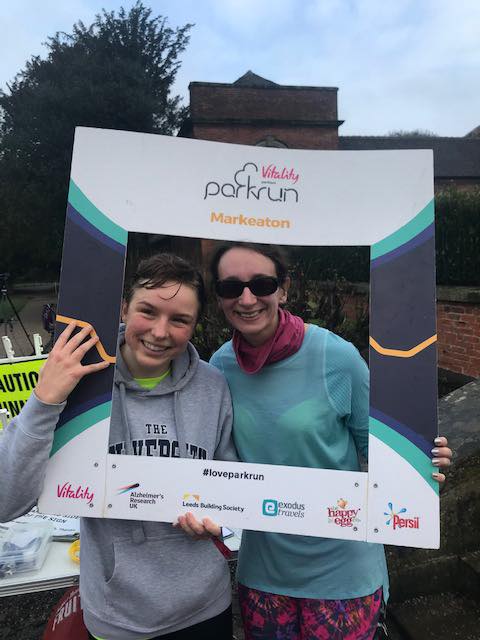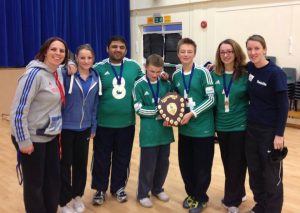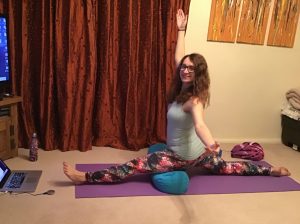
June 24, 2020, by Hannah Webber
DeafBlind Awareness Week 2020 – Student Experience
To celebrate DeafBlind Awareness Week (24-30 June 2020) we are profiling one of the University’s alumni – Molly O’Brien (2016).
Molly has a severe hearing and visual impairment and currently works as a researcher for a small local charity supporting deaf women. During her time at Nottingham she embraced a wide range of sport and fitness opportunities – demonstrating that her disability was not always a barrier to experiencing new things.
Molly kindly took some time out of her day to answer a few questions for us on her experiences.
How did you find your experience of University?
I really enjoyed my experience of University, it was challenging but also many positives and triumphs. There were many opportunities to become involved with various societies and sports, which I was able to access with support.
Outside of your studies, what else did you get involved with when you were at Nottingham?
When I was at Nottingham I was involved with various Students’ Union activities, societies and sports. I was heavily involved with the Disabled Students’ Network and was elected the Disabled Students Officer in my final year at University.
I have never really thought of myself as a “sporty person” before University, but I decided to access as much as I possibly could. Through this I discovered my love of yoga, I also had a sports membership, regularly going to the gym and swimming, as well as joining the University’s goalball club. With goalball, I was able to take part in a team sport for the first time, as so many team sports are not accessible or adaptable for me. It was also great to have the opportunity to be able to try new sports, like horse riding in an inclusive way.

This photo shows Molly with her goalball team mates (second from the right), having just won a regional competition.
Can you tell us about the challenges that you faced in trying to get involved with societies, sport and fitness?
Particularly at the beginning of University I had low confidence and self-esteem, so did not feel completely comfortable or confident enough to get involved. As my confidence and my access to support increased I was able to become more involved. I had difficulties in being able to find my way around, find places and rooms – I like to try to find my way as much as possible. I had a student buddy which was really helpful with this, as they assisted me in finding places as well as attending exercise classes and the gym with me.
What benefits do you feel that you gained from getting active at Nottingham?
For me it was incredibly important to be active at University. The inclusive opportunities at Nottingham were fantastic. I enjoyed my studies, but it was equally important to me to simply move and be active. Fitness and being active had so many positive mental, psychological and emotional benefits for me. Being active at University also had many social benefits, it was a great way for me to socialise with others. Most of my fantastic friends from University are from my involvement with the Disabled Students’ Network, various sports and fitness activities.
What has been a highlight of University life for you?
That’s so hard, there’s so many highlights! Academic highlights are the great feeling of succeeding at writing difficult essays and dissertations. I was very proud of completing my Masters dissertation.
Social, sports and fitness highlights definitely are having the opportunity and access to trying new sports and fitness activities. Another highlight has to be holding the role of Disabled Students’ Officer and being able to make a difference at University.
What are you doing now and how do you think that being active supported your journey?
After leaving University I struggled to gain employment for 3 years. During those 3 years, I found that exercise became even more important to me and gave me a positive focus. I continued to practice yoga as much as I could. I even started running, with brilliant guide runners. It still amazes me that I started running, I always said “I don’t do running!” and now I run.
I have found my balance improve from taking part in activities such as ballet and yoga. Having sensory impairments I know I’m more likely to have difficulties with my balance, but I find I’m able to use other muscles and weight placement to gain good balance. Having good balance is so useful.
In my job, although I’m a Researcher I also contribute to the overall work of the whole charity in organising various events. I always get excited about anything fitness related. I also organised an accessible yoga workshop for deaf women, which went really well.
What advice would you give to students coming to University with sensory impairments?
Know your own support and communications needs, what support you need and how best to explain this to others. This can be hard, but you know your own sensory impairment best so it’s important to work on explaining how others can assist and make things more accessible for you. This can be very empowering.
If you’re interested in becoming involved in societies and sports, you’ll probably have to try a few before you find what works for you and what you can access depending upon you sensory impairments. Focus on what works for you and what you enjoy. Make the most of accessible inclusive opportunities available to you at University.
University will be a challenge, but there will be so many positives too.
To find out more about our inclusive sport opportunities please visit: https://www.nottingham.ac.uk/sport/inclusivesport/index.aspx
No comments yet, fill out a comment to be the first


Leave a Reply